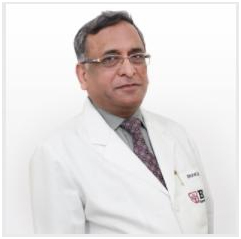AHMEDABA, JULY 13
Immediate vaccination will enable us to achieve herd immunity while also reducing the chances of black fungus, severe health complications, side effects, blood clots, and secondary infections. The panelists also expressed the concern that if we lower our guard, then the third wave is imminent and will likely begin in August and peak in November. Further, advocated that the opening of educational institutions can wait till all students get the first jab.
They were speaking at a panel discussion on ‘Covid-19: Lessons Learnt and Planning Forward’ organized by Neuberg Diagnostics. They echoed the sentiment that Delta plus Covid-19 variant continues to be a cause of concern and quick vaccination is the only weapon we have at hand.
Professor and Padma Shri awardee Dr. Mohan Kameswaran, Otorhinolaryngologist, Founder, Madras ENT Research Foundation, Chennai, said, “We witnessed the first case of Mucormycosis (black fungus – severe and rare fungal infection) in March, the cases peaked from 2 to 3 in March to 10 to 15 cases in May, with a mortality rate of 40 percent to 50 percent. Although high, it is not as high as anticipated. The major issue is the lack of relevant drugs to treat Mucormycosis. In Tamil Nadu area, the spread of Mucormycosis became epidemic within pandemic.”
He added, “60 percent to 70 percent of the patients who came to me with black fungus had not taken the vaccine, 25-30 percent had taken one dose, and less than 5 percent had taken both doses. Thus, people who have taken both doses have a good chance against Covid-19 infection and are much less prone to black fungus.”
To a query on opening of educational institutions, Dr Kameshwaran said, “The opening of educational institutions can wait till all students get the first jab. All stakeholders should wait till November and act according to the advise of pandemic experts and take ain the larger interest of the students.”

On the third wave, Dr. Rajinder Kumar Singal, Senior Director & HOD – Internal Medicine, BLK Max Hospital, New Delhi, said, “We are still not out of the second wave but are ready for the third wave. The third wave is expected to be less severe than the second wave due to increased vaccination. About 21% of the Indian population has received the first dose, and 4% has received both vaccine doses. However, quick vaccination, Covid-19 appropriate behavior and absence of super spreader events will be key to stop the spread of the infection.”
Dr Bhavini Shah, Director, Neuberg Centre of Genomic Medicine, Ahmedabad, said, “Antibody tests on hundreds of people vaccinated with the second dose of a Covid-19 vaccine indicate that booster shots may be required for the population. The findings were made after checking antibody levels of nearly 30,000 people in Gujarat by us. Out of these numbers, researchers focused on 500 healthcare workers. We found that people would require a flu-like booster shot every year to pep-up immunity.”
Dr. Hemalata Arora, General Physician & Infectious Disease Specialist, Nanavati Max Super Speciality Hospital, Mumbai, said, “Antibodies produced by the vaccine protect against Covid, complications, side-effects, blood clotting, secondary infections; hence one must get vaccinated.”
She added, “Studies are being done on using mRNA vaccines for booster doses rather than taking the same DNA vaccines we took the first and second time. Mixing might be more appropriate, though there may be some side effects. More India-based studies are required on this.”












